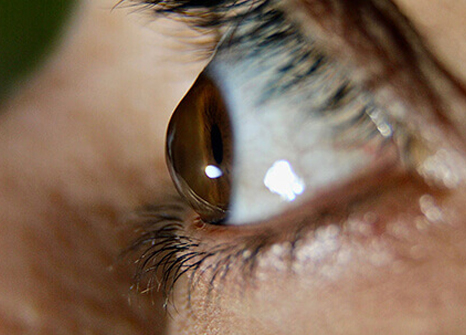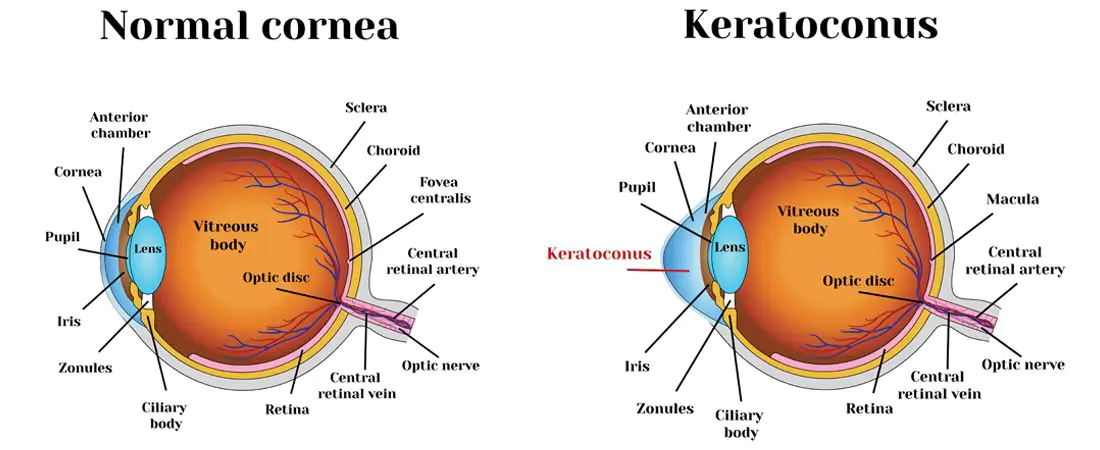- Call : +91-9321842424
- info@smartvisioneyecentre.com
- Andheri East, Mumbai
Welcome to Smart Vision Eye Centre, a premier facility in Andheri dedicated to providing advanced treatment for Keratoconus under the expert care of Dr. Seema Behl. Our center offers a wide range of treatment options tailored to each patient's unique needs, ensuring optimal visual outcomes and improved quality of life.
Keratoconus is a progressive eye condition that affects the cornea, leading to its thinning and a cone-like bulge. This results in distorted vision, myopia, astigmatism, and other visual impairments. The exact causes of Keratoconus are not fully understood but are linked to genetic predisposition, oxidative damage, excessive eye rubbing, and environmental factors like UV exposure.

1. Enzyme Imbalance: Research suggests that an imbalance of enzymes within the corneal tissue weakens the cornea, leading to thinning and bulging.
2. Genetic Predisposition: Keratoconus may have a genetic component, with a tendency to run in families.
2. Environmental Factors: Overexposure to UV rays, chronic eye irritation, and improperly fitting contact lenses can contribute to the development of Keratoconus.
1. Myopia and Astigmatism: Patients experience nearsightedness and astigmatism due to the irregular shape of the cornea.
2. Vision Fluctuations: Frequent changes in glasses prescription and fluctuating vision.
2. Glare and Light Sensitivity: Especially noticeable at night.
2. Difficulty with Corrective Lenses: In advanced stages, glasses may not provide clear vision, necessitating hard or semi-soft contact lenses.

1. Eye Refraction: This test measures your eyes using special equipment to determine the sharpest vision by looking through a phoropter or a retinoscope.
2. Slit-Lamp Examination: A low-powered microscope is used to evaluate the shape of the cornea and detect potential eye problems by directing a beam of light onto the eye's surface.
2. Keratometry: This test focuses a circle of light on the cornea to measure reflection, determining the basic shape of the cornea.
2. Computerized Corneal Mapping: Special photographic tests like corneal topography and corneal tomography create detailed shape maps of the cornea, recording images to detect early signs of keratoconus and measure corneal thickness.
1. Corrective Lenses:
2. Advanced Contact Lens Options:
3. Surgical Treatment Options for Keratoconus
| Aspect/Surgery | Intacs (Intra Corneal Ring Segments) | Corneal Collagen Crosslinking (CXL) | Penetrating Keratoplasty (PK) | Deep Anterior Lamellar Keratoplasty (DALK) | Descemet's Membrane Endothelial Keratoplasty(DMEK) |
|---|---|---|---|---|---|
| Description | Rings to flatten corneal curvature. | Stabilizes keratoconus with riboflavin. | Full-thickness corneal transplantation. | Partial thickness corneal transplantation. | Innermost corneal layer replacement. |
| Benefits | Improves vision, outpatient procedure, removable, minimally invasive. | Prevents vision deterioration, early detection, safe for early cases. | Excellent visual outcomes, longer recovery, for specific conditions. | Faster recovery, minimal rejection risk, improved vision. | Quick visual recovery, better outcomes, reduced rejection risk. |
| Prognosis | Reshapes cornea, stabilizes ectasia, improves vision and stability. | Halts keratoconus progression, stabilizes vision, reduces need for transplants. | Excellent prognosis with high graft survival rate. | Higher endothelial survival, lower hypertension risk compared to PK. | Excellent visual outcomes but concerns about long-term graft survival and potential regrafting. |
| Success Rate | Effective for mild to moderate keratoconus management. | High success rate in stopping keratoconus progression & improving stability. | High success rates with 95.6% survival rate at 5 years for keratoconus treatment. | High graft survival rates of 100%, 92.9%, and 90.4% at 1-, 3-, and 5-years respectively in keratoconus patients. | Varying 5-year graft survival rates (83%-96%) with lower rejection rates compared to other procedures like DSAEK. |
These surgical treatments offer advanced solutions for managing Keratoconus, providing patients with improved vision, stability, and reduced dependency on corrective lenses. Each procedure is tailored to address specific stages and needs of individuals affected by this condition.
Regular Eye Exams
UV Protection
Eye Rubbing
Genetic Counseling
Contact Lens Care
By following these preventive measures and seeking timely treatment, individuals can reduce the risk of developing keratoconus or slow its progression, ultimately preserving vision and eye health.
Smart Vision Eye Centre, led by Dr. Seema Behl, offers a comprehensive approach to managing Keratoconus, ensuring personalized care and access to state-of-the-art treatments that cater to each patient's specific condition and requirements.

